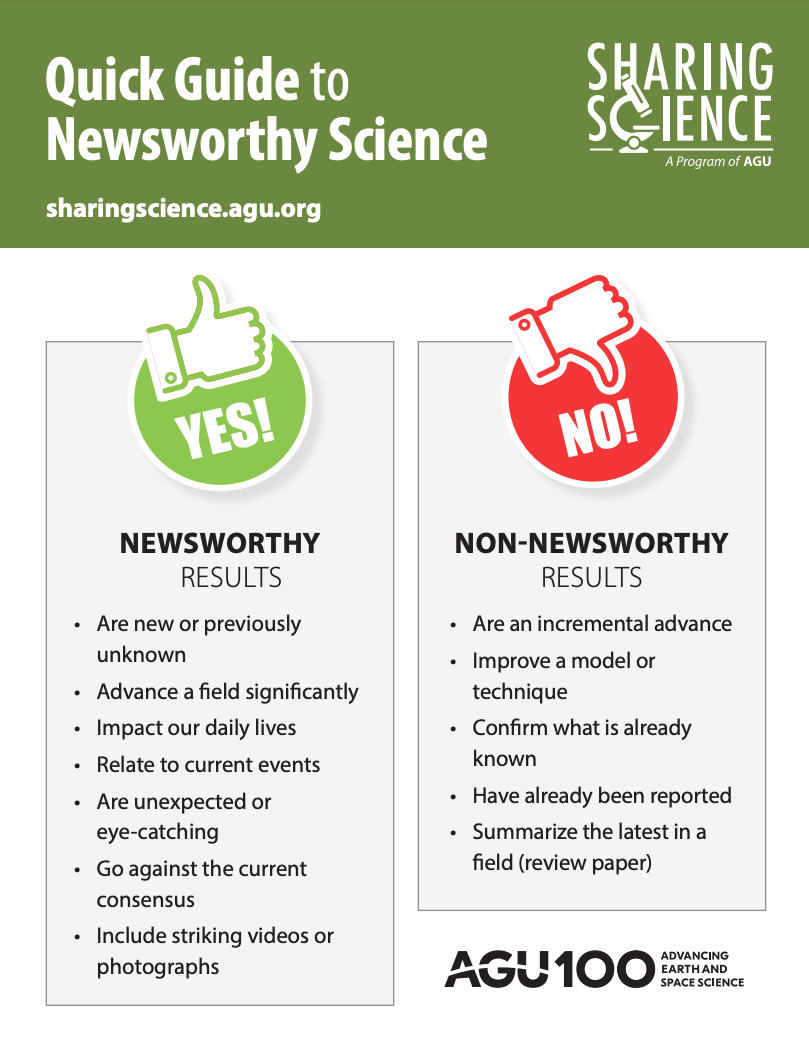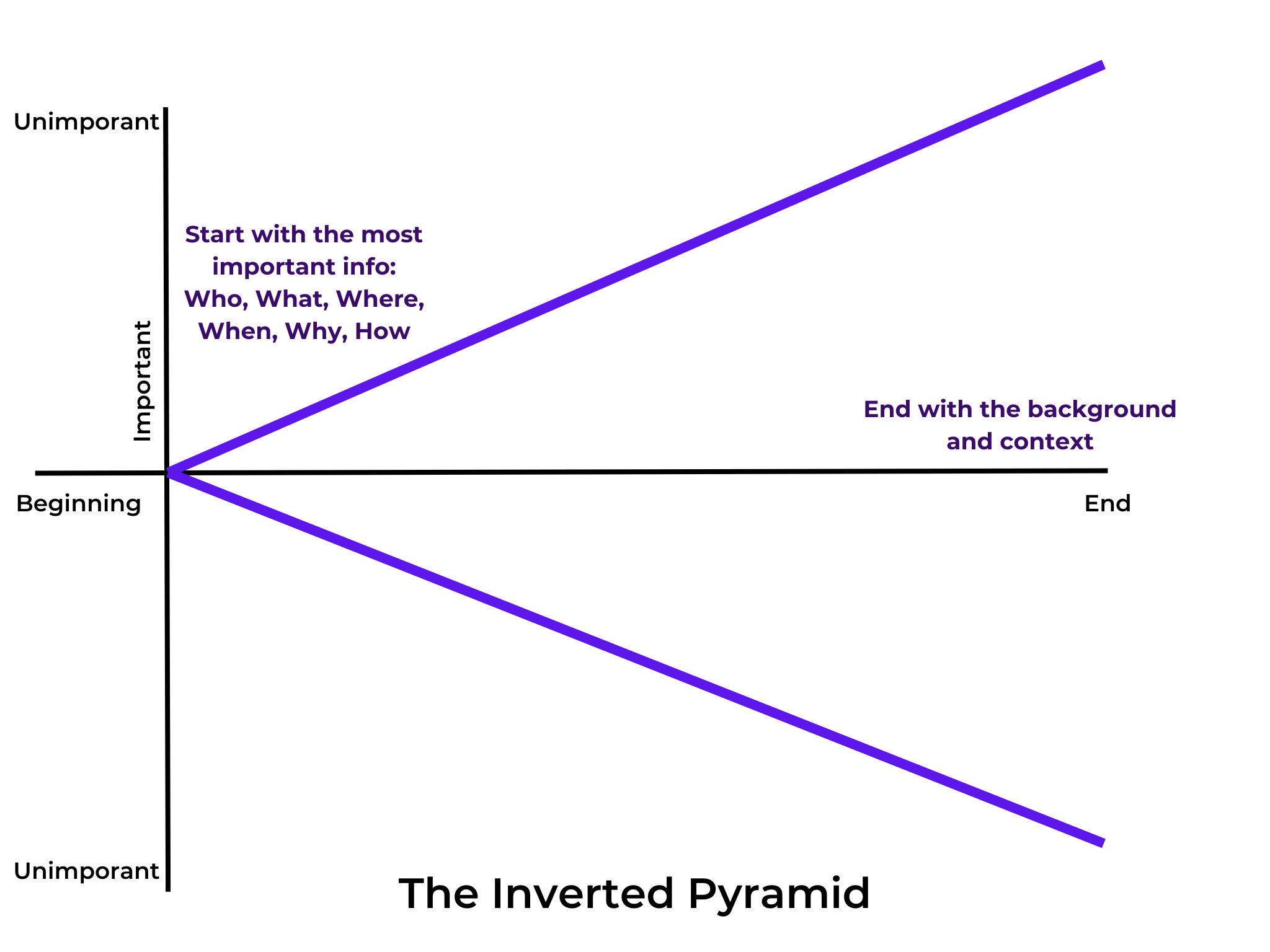The Where
About the Lesson
Purpose
Introduce the methods and best practices for sharing your work publicly
Goals and Outcomes:
- Participants will be able to describe the different methods for sharing their work themselves
- Participants will be able to describe the different methods for sharing their work through the media
- Participants will critically appraise if they should share themselves or share through media
- Participants will write their own draft of a press release for their work
- Participants will practice being on both sides of the interview process
Lesson Notes
The Big Questions for all Communications
- What is your Point? What do you want people to take away?
- What is your Goal? What do you want out of the communication?
- What does success look like? How can you tell if you succeed?
- Always keep these in mind!
Who is going to do the sharing?
- You
- University
- Journal
- Department
- Reporter
- Event Promoter
Who controls the message matters
- Why would you want to work with a reporter/outlet?
- Why would you want to share your work yourself?
Deciding which path is for you
- How much control do you want?
- If the answer is anything other than you do not care or none, then you want to share it yourself
- How much work do you want to do?
- If the answer is anything other a lot of it, then you want someone else to share it
- Are you sharing your results or your process?
- If it is your process, you probably want to share it yourself
- If it is your results, either path is good
- How niche is your work?
- The more niche the more likely you will have to share it yourself
- Is there an outlet/reporter that already covers your area?
- If there is you have a choice
- If there is not, you don’t
-
Would the media even cover it?
- Newsworthiness
- How many people could be impacted?
- The more people the more newsworthy
- How recent/new is your work?
- Media craves newness
- Is there a hook into recent events?
- Older research can be made newsworthy if world events make it so
- Can your work be located in a place?
- Local news reporters want to cover news that is about their location
- Stories are easier to tell if they take place somewhere specific
- Readers are more interested if a story takes place in their community
- Is there a conflict/disagreement involved in your work?
- Conflict drives narrative
- Is there something unexpected about your work?
- The more out of the ordinary the more newsworthy
- Is anyone who took part in your research, or their institutions, well known?
- Public figures and institutions are more newsworthy
- Does your research say something about a public figure or their actions?
- Are there visuals?
- The more breathtaking the more newsworthy

- How many people could be impacted?
- Newsworthiness
Sharing your own mathematics
-
Style
-
Explainer
- Area focused
- Problem Focused
- Application Focused
-
Narrative
- Person focused
- Subject focused
- Fiction
-
Marketing
- Fund Raising
- Policy Push
- Result Publicity
-
-
Writing
-
Publishing with an outlet
- Feature/News Piece
- Great for sharing results, helping to educate about a field, and building your profile. A medium amount of time constrained work.
- Opinion Piece/Letter to the Editor
- Great for adding context to hard to explain topics, advocating for a specific public policy, and helping to influence public thought. A medium amount of time constrained work.
- Pitching
- Short, jargon free description of what you want to report about
- Tips
- It should be a story with characters and events
- It should consider its audience
- It should be clear that you have considered where the story fits in the overall landscape of media and scholarship
- The Conversation
- Quanta
- Wired
- Scientific American
- Smithsonian magazine
- Science Friday
- PBS
- Feature/News Piece
-
Personal Blog
- Great for process and results, building community, and building your public profile. Amount of work can vary, and no time constraint.
-
Fiction, Comics, Poetry
- Can reach wider audiences that may not be specifically interested in mathematics, or other STEM areas. Much more about sharing a general sense of what it means to be a researcher and how it feels than sharing anything specific. Amount of work can vary, but it is time constrained.
-
Zines
- Can reach people who might not be reached by any of the other methods. Since it is a physical object it can be felt to be more valuable to those who have them and therefore it is a good bonus for people who support you and your work in some way. A lot of time constrained work.
-
-
Audio
-
Platforms
- Radio
- Podcasts
- As a Guest
- Great for sharing results and building your public profile. Minimal time constrained work.
- As the Host
- Great for building community and building you and your guests’ public profiles. A lot of work with possible time constraints.
-
-
Video
-
Platforms
- TV/Movies
- YouTube
- As a Guest
- Great for sharing results and building your public profile. Minimal time constrained work.
- As the Host
- Great for teaching, building community, and building you and your guests’ public profiles. A lot of work, with possible time constraints.
-
-
Social Media
-
Text
- Mathstodon
- Threads
- Blue Sky
- Great for sharing process, can be useful for building community and profile. Minimal to medium work per post, but a lot of work overall with no time constraints
-
Visual
- Still Images
- Video
- TikTok
- IG Reels
- Great for education and building community and profile. Medium to a lot of work per post, and a lot of work overall with no time constraints
- Still Images
-
-
Community Outreach
- Professional Communities (Conferences, Discord, Listservs, etc)
- Tends to lean more technical, great for networking and advancing the scholarly conversation. Minimal to a lot of time-constrained work.
- Informal Education spaces (museums, libraries, etc)
- Great for education and helping building interest in STEM. Medium to a lot of time-constrained work.
- Live Events (storytelling, public lectures, maths busking, etc)
- Great for helping build public interest in STEM. Medium to a lot of time-constrained work.
- Professional Communities (Conferences, Discord, Listservs, etc)
-
Example Time
- Quanta The Simple Geometry That Predicts Molecular Mosaics
- Minute Physics Dimensions
- Carry the Two Dario Bauso on Honeybees at 4:20-7:00 (Discussing Collective Decision Making with Bees)
- Kyne on Fourier Transforms
- Math Busking (Katie Steckles on pizza slices)
- Comedy (Matt Parker on vortex Equations)
-
Pitch session
- If you were going to share your research story using one of these methods:
- Which would it be
- What would you do
- Why?
- If you were going to share your research story using one of these methods:
Having your mathematics shared
-
Press Releases
-
What they are
- Jagon light summary of research result, usually an article
- Share on institutional websites and services like Eurekaalert and Newswise
- Often shared directly with journalists
-
Activity: Write the first paragraph of a press release about your most recent work
- 5 W’s and H of the Inverted Pyramid

- 5 W’s and H of the Inverted Pyramid
- AND, BUT, THEREFORE
- This is true/happened AND this is true/happened BUT this thing complicates that THEREFORE we did this which resolved things
-
-
Where to go for help
-
Being a part of someone else’s piece
-
Journalists and Mathematicians
- How they are similar?
- They both ask questions
- Answer questions through investigating current knowledge, testing existing knowledge through reproducuction, and then developing new knowledge where there are gaps through observations and gathering and analyzing data
- Cite existing knowledge to support claims
- Communicate their findings and take part in a larger community conversation
- Should be self-correcting
- How they are different?
- Different audiences
- Different time scales
- Different bosses and business priorities
- How they are similar?
-
Questions to ask
- What is the output?
- Who is the audience?
- What is the timeline?
- Journalists often has tight deadlines to work with
- How will what I tell you be used?
- direct quotes
- paraphrasing
- background
- Are there other people involved?
-
Interviewing Best Practices
- Concise
- Avoid Jargon
- Mention where more context or a tangent is possible, but wait for the reporter to bring it up
- Reporters generally do not share questions or articles pre-publication
- They may be able to share back the quotes they plan to use though
-
Interviewer/Interviewee Activity
- Share your Press Release paragraph with a partner
- Develop 3-5 questions from the paragraph
- Ask your partner your questions
- Answer your partner’s questions
-
Acknowledgements
- Much of this material was adapted from previous work by the wonderful Sadie Witkoswki